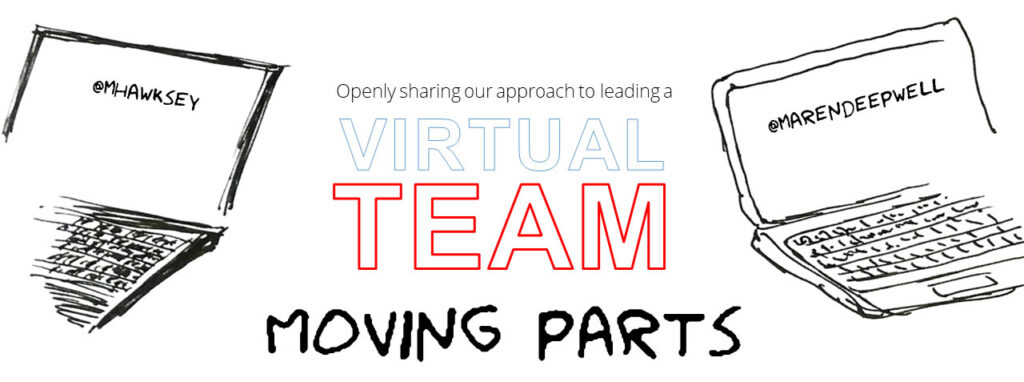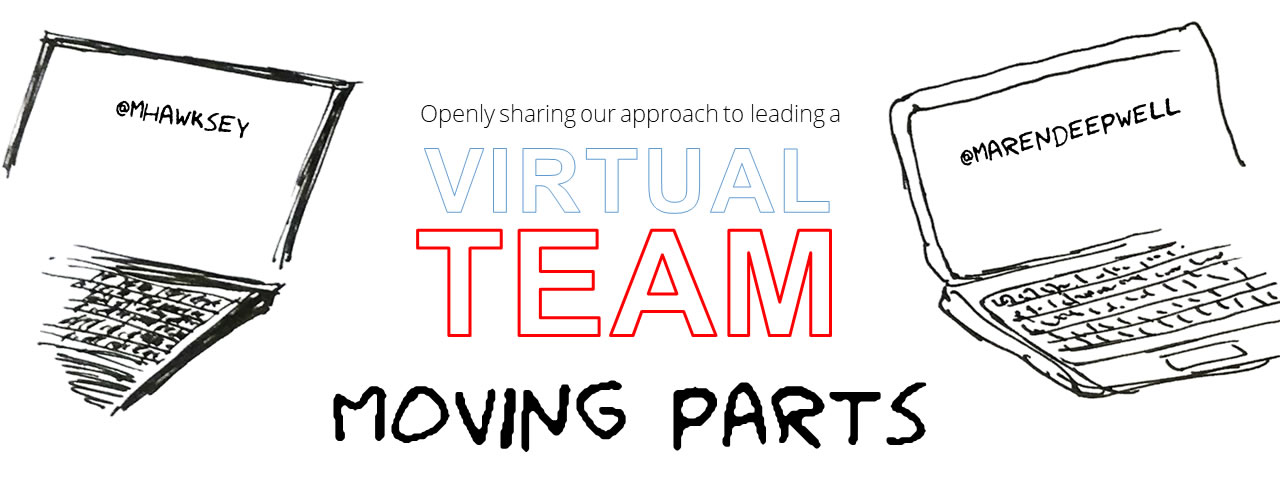
Welcome to this month’s post (cross-posted here) in which we, that is Maren Deepwell (@marendeepwell) and Martin Hawksey (@mhawksey), openly share our approach to leading a virtual team. If this is your first time visiting this post series or you’d like to review previous posts go to our Virtual Teams summary page.
This month we start our third year as a virtual team and we talk about the ups and downs of moving house as home workers, how to give yourself a break during times of upheaval and supporting each other.
February
Maren: I have been looking back at the first post in our series. Although it’s two years ago, that moment of closing our physical office door for the last time and starting the next morning as a virtual team is still palpable. At the time, creating stability, a sense of security and permanence seemed like a formidable challenge. Every aspect of our operation was in flux, new systems everywhere we looked. Tasks like receiving post or signing an invoice became things that required an extraordinary amount of time and thought. Two years on and nearly half of our staff team are planning to move house over the next year. Instead of work being in flux and ever changing, the ability to take our work with us, to remain part of a virtual team regardless of location, provides security. It’s interesting to reflect on how things have changed. We have supported quite a few colleagues through home working house moves and this year it’s our turn. What are your thoughts?
Martin: When I started working for ALT over 6 years ago the ability to work from home was an essential requirement as relocating to our then base of operations in Oxford was simply not an option. Six years on the ability to relocate without having to give up my job is another big win, although admittedly our move this time is just 10 minutes away. When looking for a new home accommodating my workspace was one of the criteria, but another was what sort of internet connectivity was available. I’m actually looking forward to setting up a new office, a chance to design my new space. Transition is also a consideration. Unfortunately we aren’t able to move straight into our new home so I’ve got a period without my own space. This is going to be a bit of a journey into the unknown, particularly in terms of connectivity. We’ll be staying in Airbnb’s so hopefully hosts have made sure they’ve got good wifi to keep guests happy and I’ve got a VPN for a secure connection. Should connectivity still be an issue I’ve got access to three different PAYG mobile networks. Over the years I’ve also accumulated a couple of portable external displays so I’m not anticipating issues, but these things can sometimes be hard to predict just as it was two years ago when we changed operations. What are your thoughts on moving?
Maren: Moving house is not something I read about in charity management handbooks! Like so many other aspects of leading people it wasn’t discussed much or at all. When you don’t have the option of working from different locations a house move often means finding a new job as well. So it’s a huge plus to be able to keep the job when you have to relocate. Since we became a virtual team more than half of us have moved and the disruption has ranged from serious and prolonged to very minimal. Moving is a big, stressful life event and has a long tail of practical consequences. Like moving offices or rather moving out of an office it takes a lot of planning and doing and that takes headspace and time. All of which causes a certain amount of distraction from work. For some work acts as a welcome break from the stress of moving as it presents more predictable problems to solve. For others productivity slows when they lose their habitual set up and environment. Although we live in a culture where working from home is becoming more normal, most parts of life aren’t really set up for it. ‘People’ just assume you ‘go to work’ and moving processes are not designed to prioritise continuity for home workers. We have taken steps to support staff during periods of transition such as providing a mobile WiFi hub (which is passed to whoever needs it), putting our flexible work policy to good use to accommodate moving dates etc and so forth. In terms of work I think house moves function in a similar way to holidays. It’s a deadline that can focus the mind and it forces you to take a step back from your usual perspective. It’s also incredibly stressful, uncomfortable and discombobulating and the only way I can deal with it is just to sit with those feelings and accept that ‘chaos’ is upon me. It reminds me, very forcefully, that every professional, no matter how successful, is a human being first and foremost. We all deserve some kindness and compassion from our colleagues and ourselves, we deserve to give ourselves a break.
Martin: I don’t know if it was prompted but it feels like the ALT team are giving me some extra care and consideration, which is quite remarkable given how caring they are already. It’s small things like pre-empting questions with “I know you are busy but could you help me with…”. In terms of disruption we now have a possible entry date for our next property which isn’t until the end of May. Whilst this length of time isn’t ideal it’s nice to have a date and it doesn’t feel like forever. In terms of planning and trying to prevent disruption a particular problem, perhaps unique to virtual teams, is the extra preparation for the equipment I store for ALT used at our face-to-face events. As I manage the livestreaming this includes AV equipment, lots of cables and magic boxes, as well as various other bits and pieces we use as part of our events. The removers we’ve employed are very nice but I don’t think I’ll be thanked if I have to ask for something accidentally put into storage. Another potential disruption looming at the time of writing is Coronavirus (COVID-19). As a distributed team we benefit from not having to send employees home should someone contract COVID-19, or spend time disinfecting workspaces. This is not to say we can ignore the risks associated with the wider impact that could happen such as the UK Government imposing travel restrictions, or members of our team becoming unwell … all part of being human. For me it’s a reminder of the benefits of small things like our Monday morning watercooler chat. As we aren’t co-located I find this is the perfect chance to see how someone is feeling.
Maren: yes, at a time when we do a risk assessment a day those touch points to check how everyone is are key. Processes and procedures are always important when an unexpected crisis hits and I suppose we have had ample opportunities to stress test ours. Virtual working makes it even more crucial to communicate regularly and effectively and it’s actually helpful, I find, not to be able to rely on being co-located but to be forced to communicate expressly. It’s an example of how working remotely promotes better practice by default. The year ahead looks like it may prompt more organisations to adopt flexible working practices and in many ways using technology to manage a crisis really worries me. Our blog series highlights so many aspects in which you need time and resources to support a transition like this effectively no matter how good the technology is: it’s never going to be seamless. I feel there is a real danger to erode support structures, labour rights and established norms that should not be disrupted. So I am glad that our way of working as a distributes team was not formed at a time of crisis, but a planned transition in which employees were consulted and supported. We chose this path. I hope what we learnt so far continues to be useful to others who are now rushing to find solutions. We certainly work in interesting times just now!
